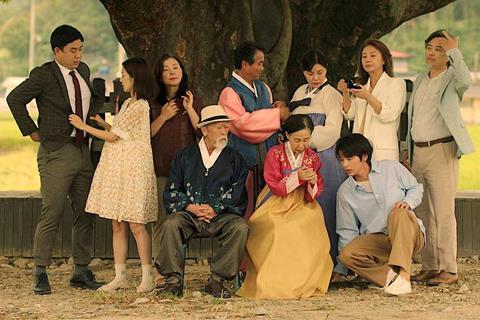A family drama set around a tofu factory is an engaging addition to the ‘Korean Cinema Today’ strand at Busan

Dir/scr: Oh Jung-min. Korea. 2023. 121mins
Near the beginning of this rich, engaging, funny, touching saga about a year in the life of a family who run a rural Korean tofu factory, it seems as if an early setback – when they shockingly run out of the ‘soft and silky’ variety of tofu – is going to be about as bad as it gets for the three-generational clan at the heart of the story. They bicker and snap at each other, but the bonds of affection are obvious. Yet in his convincing debut feature, writer-director Oh Jung-min starts to send ripples of disturbance through the narrative, gradually turning a light story for local audiences with into something more resonant and universal.
Male bias and son-worship in Korean society are delicately held up for scrutiny in a film that is in its own small way a kind of tofu-dynasty ’Succession’
Tucked away in the Korean Cinema Today section of Busan International Film Festival, House Of The Seasons takes a while to ignite, held back in part by its sentimental soundtrack. Eventually, though, it burns with real intensity, mixing quiet humour and melancholy in a way that’s a little reminiscent of Japanese auteur Hirokazu Kore-eda’s explorations of family dynamics. Offbeat arthouse distributors prepared to weigh the risk of taking on a gentle Korean dramedy by a complete unknown against the possibility of leaving audiences surprised and delighted might want to take a look.
Two lovely credit sequences bookend the film. The milky blur we see at first turns out to be a veil of steam from the tofu-making process; it clears to reveal the busy factory and its staff. The final sequence is a long shot that takes in the entire, geographically circumscribed world of the film, as an old man slowly walks up into the hills towards the right-hand edge of the screen. He is Kim seung-pil (Woo Sang-jeon), the stern ageing patriarch of a clan that congregates around a big traditional ‘hanok’ rural house near the factory, though not all of them live there.
It’s easy to spot grandma Mal-nyeo (Son Sook) – her crabby authority over the family’s younger women is established early on when she decrees that a whole batch of tofu needs to be remade. But it takes a while to work out the sons and daughters of the next generation, along with the in-laws. The third generation is easier to spot: he’s Seong-jin (an impressive Kang Seung-ho), the adored prodigal son, an aspiring actor now based in Seoul who is eagerly awaited on this hot summer’s day when the annual ‘ancestor’s rites’ are due to be celebrated. As soon as he appears, grandma orders the air-conditioning to be put on, though she refused when the younger women in her family asked before – among them Seong-jin’s pregnant older sister Mi-hwa (Kim See-eun). She’s third-generation too, but she might as well be no-generation for all the attention she gets from grandma.
Male bias and son-worship in Korean society are delicately held up for scrutiny in a film that is in its own small way a kind of tofu-dynasty Succession. It’s a state of affairs the women simply take for granted. Seong-jim’s aunt, Hae-sook (Cha Mi-kyeong), is reduced to clandestine measures to get what she believes is hers, as her husband – one of two potential male heirs of the family business, along with Seong-jin’s hard-drinking father Tae-geun (Oh Man-seok) – is a bedridden invalid. The only way for a woman to achieve power in this world is to get far away from the ‘family farm’, as the sole second-generation daughter, Ok-ja (Jung Jae-un) has done, marrying a rich businessman whose plans to invest in Vietnam attract bitter comments from grandpa about working with those ‘damn Commies’.
Another of the themes quietly explored here is the generation-skipping that seems to have intensified in our post-pandemic times, as children reach out to their grandparents. From the moment Seong-jin hesitates before kneeling to bow to his grandfather (it’s clearly not the kind of thing his friends in Seoul would ever consider) through to the point when he passes an adult diaper to the old man, who has been caught short on a cemetery visit, this rapport between people who both have their own issues with the generation that comes in-between is drawn with real sensitivity.
Talking about his son’s stalled acting career, Tae-geun quips that “trying to spot you in that last TV soap was like playing Where’s Wally”. Spanning what seems to be six months from summer’s heat to the thaw at the end of winter, House Of The Seasons benefits from that same heightened level of attention. A glimpse of the blistered skin on Mi-hwa’s shoulder is half-explained only much later, in a film that doesn’t feel the need to spell everything out. Over the course of two hours, the trauma of the Korean War and the subsequent pain, for many young male South Koreans, of compulsory military service, are both alluded to. Seong-jin is revealed to have a cousin in a lovely ‘show, don’t tell’ funeral scene. Soon after, the taking in of rain-soaked tofu sheets from a washing line in the courtyard of the family home is a beautiful Ozu-like touch, showing both how everyday life was put on hold when the death happened, and how it must inevitably, somehow, return.
Production company/international sales: Daemyung Film, daemyungfilm@naver.com
Producers: Oh Jung-min, Jang Ji-won, Jeong Jo-eun
Production design: Kim Chae-ram
Editing: Oh Jung-min
Cinematography: Lee Jin-keun
Music: Jan Yeong-gyu, Jeong Jung-yeop
Main cast: Kang Seung-ho, Woo Sang-jeon, Son Sook, Cha Mi-kyeong, Oh Man-seok, Ann Min-young, Jung Jae-un, Seo Hun-chul, Kim See-eun, Kang Taeu






![The Brightest SunScreen[Courtesy HKIFF]](https://d1nslcd7m2225b.cloudfront.net/Pictures/274x183/3/5/0/1448350_thebrightestsunscreencourtesyhkiff_312678.jpg)













![The Brightest SunScreen[Courtesy HKIFF]](https://d1nslcd7m2225b.cloudfront.net/Pictures/100x67/3/5/0/1448350_thebrightestsunscreencourtesyhkiff_312678.jpg)




No comments yet